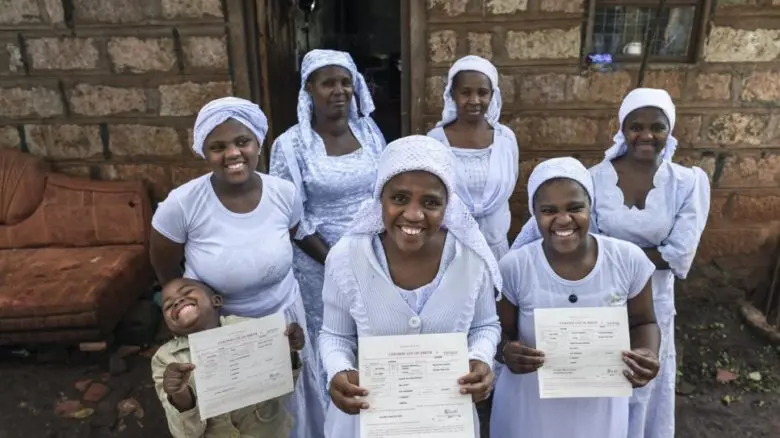
Stateless Shona woman, Nosizi Reuben (front-centre) poses with her family as she holds up her recently-issued birth certificate at home in Kinoo, Kenya. © UNHCR/Anthony Karumba
Over 18,000 stateless people in Kenya struggle to access basic services as they lack official identity documents. A young woman has made history as the first stateless Shona woman to make it to university.
Nosizi Dube has always been a top performer in school but every year, her chances of advancing to the next level got slimmer. Born into the stateless Shona community in Kenya, she did not have the crucial documents to prove her identity and register for exams.
Now in her first semester as an economics student at the University of Nairobi – one of the country’s largest higher learning institutions – she is making history as the very first Shona woman to make it this far.
“When I found out that I got into university, it was the most joyful experience of my life. As a stateless girl, it’s been a challenging but great journey to get to where I am,” says the soft-spoken 20-year-old.
The Shona people arrived in Kenya from what was then Rhodesia – now Zimbabwe – as Christian missionaries in the 1960s. They carried Rhodesian passports and were registered as British subjects. After Kenya’s independence in 1963, they had a two-year window to register as Kenyan citizens, which many missed because they either did not know about or did not have access to the processes, rendering them stateless.
“It’s like you are a ghost … You don’t exist.”
“It’s like you are a ghost in the country that you are living in. You don’t exist,” explains Nosizi.
Wanja Munaita, an Assistant Protection Officer for UNHCR, the UN Refugee Agency in Kenya, highlights the difficulties that stateless people experience due to lack of identity documents.
“Without proof of nationality, the Shona and other stateless communities are not able to fully access basic services like education and health”, she says. “They cannot travel, own property, be formally employed or access financial services, among other rights that Kenyan citizens enjoy.”
Stateless people often face political and economic marginalization and discrimination, making them vulnerable to exploitation and abuse.





